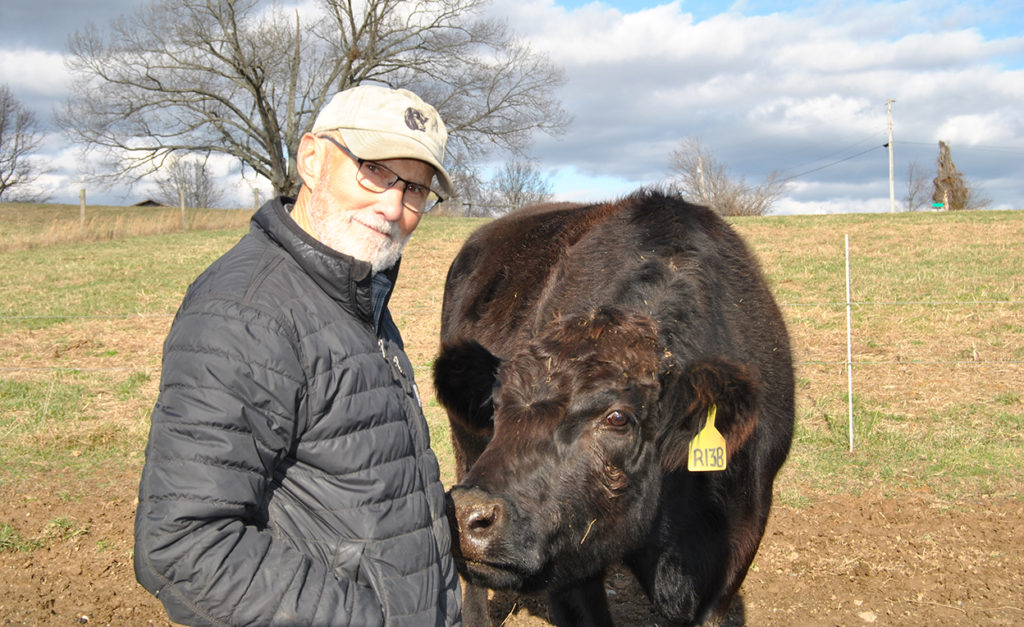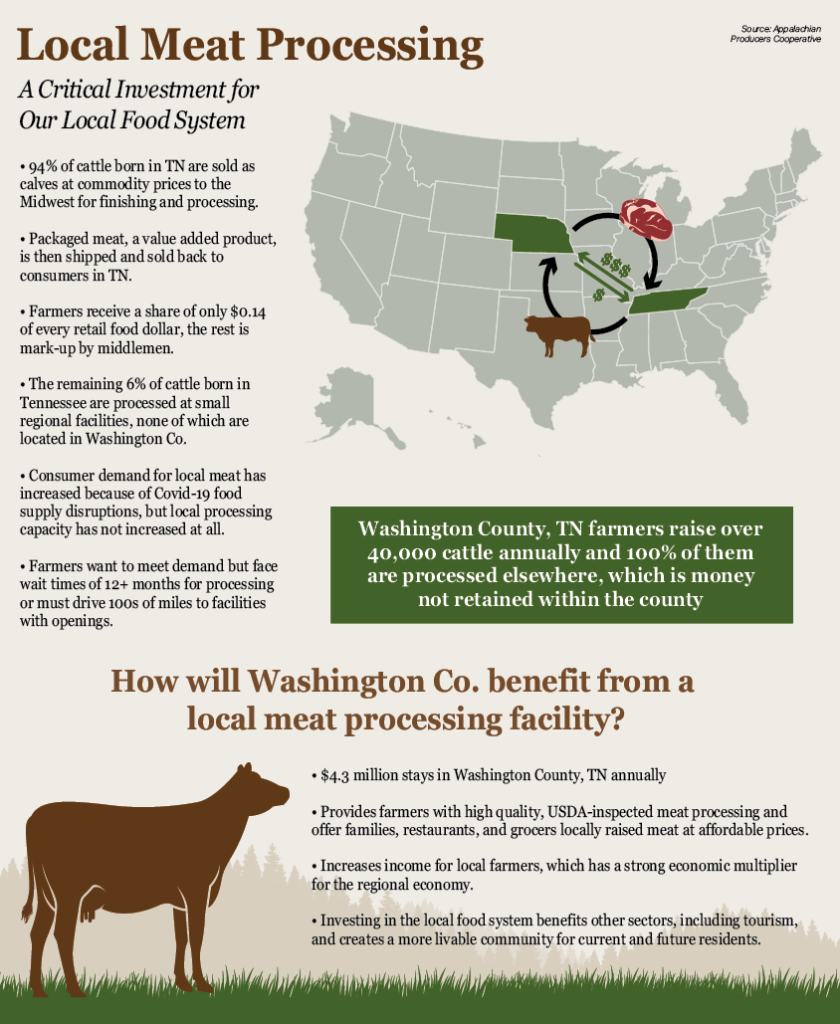
By A.J. Kaufman
Supply chain interruptions and extended delivery delays hampered businesses and individuals alike the last few years.
Northeast Tennessee and Southwest Virginia were no exception.
Spurred on by concern over these issues, along with meat shortages, a novel idea going back five years is blossoming into reality quicker than forecast.
In March, Washington County Commissioners approved $2 million in American Rescue Plan funds for the Appalachian Producers Cooperative’s (APC) development of a meat processing plant for local livestock farmers.
Cooperative leaders believe the plant planned for Jonesborough is necessary, when more than 90% of the beef in Tennessee is not processed in the Volunteer State. This dilemma causes farmers to lose out on potential profits, and Tri-Cities consumers are not eating meat raised in their area, because products often are sent to the Midwest to be processed and brought back south. This uneconomical process can also be susceptible to additional bureaucratic delays and assorted supply chain woes.
County commissioners approved the facility funding nine months ago, deeming it an investment Washington County’s agricultural future and a “generational investment …that also keeps everybody fed.”
The APC plans to locate its operation off Highway 11E near the Jonesborough Flea Market in the spring of 2024 and employ up to 22 people. The plan is to eventually make the processing facility a retail market for people to buy locally raised beef, pork, lamb and goat.
One concern expressed by opponents is the county essentially gifting farmers $2 million in taxpayer dollars. With a total project tab nearing $10 million, $2 million does comes from Washington County, with about $2-3 million coming in grants, and another $5 million in bank loans.
Alexis Close, Program Director with the Appalachian Resource Conservation and Development Council (ARCD) in Johnson City, supports the endeavor. She also admits that while the facility will be beneficial, it is not large enough to solve the entire problem.
Close explained that having one or two of these facilities in every county is the best way to make a true dent in the supply chain issues.
A half century ago, every county encompassed these kinds of facilities and most food was locally produced, but per Close, “decades of consolidation have made our country reliant on four main companies who control 80-95% of the meat processing capacity.”
“The pandemic, supply chain problems, transportation bottlenecks, facility fires, and even cyber attacks have shown how vulnerable this system is to disruption,” Close continued, then added, “Meat prices are one of the main drivers of inflation currently, though the farmers raising the cattle are seeing historically low percentages of the final retail dollar. The Appalachian Producers Cooperative will be farmer owned, so there will be no middlemen between the folks raising the cattle and the folks who want to purchase high quality local meat.”
John Abe Teague, who worked for Farm Bureau Insurance and also as the district director for Tennessee U.S. Rep. Phil Roe, retired to full-time cattle farming on his 55 acres in Telford roughly five years ago. Now an APC board member, he’s been a crucial player in bringing the processing plant concept to fruition. He’s sanguine about its potential.
“This is a home run for farmers in our region, and not just Washington County,” Teague told the News & Neighbor in November. “It’s a team effort. We have a lot of people that are very interested in making this a reality. We are mighty proud.”
Some local cattle farmers wait up to 18 months for their products to get processed.
“It’s (the new facility) got land, infrastructure, and gives us the ability to raise beef, so we have locally raised beef in our supermarkets,” Teague added. “This gives us an opportunity to use the land for something besides just growing weeds.”
Education is an added benefit.

The University of Tennessee Extension in Jonesborough will work with Washington County farmers through the Master Beef Producer Program, which provides educational demonstrations in the wide-ranging area of beef cattle production.
“We need to train farmers, and hope we can use this as a training ground for young people to enter the butchering business,” Teague said. “And we’ll teach them the humane way to do it.”
To that end, Teague says that he doesn’t spray his cattle farm with chemicals or use antibiotic steroids or hormones, believing that people “want clean beef.”
He said Hamilton Meats in Johnson City — a main outlet for fresh specialty cut meats since 1970 — is also on board, saying the processing plant won’t hurt their business because people enjoy locally raised beef.
Mike Saylor, a full-time dairyman, is another of the 12 board members. His dairy is one of those three remaining in Washington County. Milk is a commodity controlled by the futures market, and its pricing is “all over the radar,” per Teague.
“For Mike to be able to raise beef with his infrastructure already in place and to sell locally will be a game changer for his family farm,” Teague claimed.
The ARCD believe the benefits to consumers are vast, too.
When beef is grown in East Tennessee, Southwest Virginia, and Western North Carolina, and then sold to local consumers, restaurants, and grocery stores, it will be the freshest available; this is mostly due to no prolonged shipping or storage times required.
As a farmer-owned cooperative, there will be no middleman in the processing either, thus reducing costs and enhancing its affordability.
We read a lot about sustainability in food these days. Proponents claim a local processing facility in Jonesborough will reduce emissions associated with transportation, processing, and cold storage due to fewer miles traversed across the Appalachian Highlands.
Teague closed by saying that two very important reasons for this processing facility are food security and “keeping our farmers farming.”



